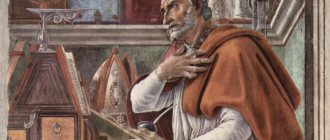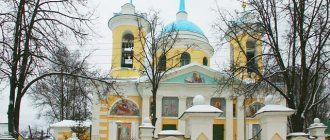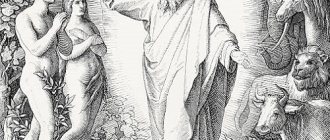Wikipedia has articles about other people with the surname Asmus.
| Valentin Asmus | |
| Valentin Valentinovich Asmus | |
| Date of Birth: | August 5, 1950(1950-08-05) (age 71) |
| Place of Birth: | Moscow, USSR |
| A country: | Russia, Russia |
| Place of duty: | Church of the Intercession of the Blessed Virgin Mary in Krasnoye Selo |
| San: | Archpriest |
| Ordained: | February 4, 1990 |
| Spiritual education: | Moscow Theological Academy |
| Church | Russian Orthodox Church |
Valentin Valentinovich Asmus
(born August 5, 1950, Moscow) - clergyman of the Russian Orthodox Church, mitred archpriest. Rector of the Church of the Intercession of the Blessed Virgin Mary in Krasnoe Selo. Associate Professor at the Moscow Theological Academy, patrolologist, Byzantine specialist.
Biography
Born into the family of the famous philosopher Valentin Ferdinandovich Asmus (1894-1975).
Studied at the Faculty of Philology (classical department) of Moscow State University. M.V. Lomonosov, who graduated in 1975. During his student years, Fr. Valentin Asmus was a parishioner of the Church of Elijah the Prophet in Obydensky Lane in Moscow.
From 1975 to 1978, Valentin Valentinovich Asmus taught Latin at the Moscow Publishing and Printing College named after. I. Fedorova. At this time, Archpriest Vsevolod Shpiller (1902-1984) became his spiritual father.
Since September 1, 1978, he taught subjects at Moscow Theological schools: Latin, Church Slavonic, Byzantine studies, Ancient Greek, church history, patrolology, history of local Orthodox churches, canon law.
On February 11, 1979, he was ordained to the rank of deacon by Archbishop Vladimir (Sabodan) of Dmitrov.
Since 1979 he served in the Church of St. Nicholas in Kuznetsy.
In 1986 he graduated from the Moscow Theological Seminary as an external student. In 1990, he graduated from the Moscow Theological Academy as an external student.
On February 4, 1990, he was ordained to the priesthood by Archbishop Alexy (Kutepov) of Zaraisk.
On February 25, 1993, he was elevated to the rank of archpriest.
In 2000, he was appointed rector of the Church of the Intercession of the Blessed Virgin Mary in Krasnoye Selo.
In 2002, he was awarded the academic degree of Master of Theology.
Since 2002 - teacher at Nikolo-Ugresh Seminary.
On April 12, 2009 he was awarded the right to wear a miter.
Currently Fr. Valentin is an associate professor at the Moscow Theological Academy (MDA), a member of the Academic Council of the Orthodox St. Tikhon's Humanitarian University (PSTGU), a teacher at the Nikolo-Ugresh Seminary, and is actively involved in the creation of the Theological Encyclopedia. Member of the editorial board of the scientific and theological almanac “Theological Works”
Lives in Moscow. Widower, late wife Inna Viktorovna Asmus, nine children.
Scientific career
In the mid-fifties of the last century, “The History of Ancient Philosophy” by V. F. Asmus produced the effect of a bomb exploding in the scientific community, giving rise to many topical debates about the nature of logic as such, which led to fierce debates in which the scientist himself actively participated.
He managed not only to systematize and streamline the process of scientific debates, but also to involve many graduate students and masters in them, who in the future became luminaries of Russian philosophy. Smirnov, Shchedrovitsky, Ivanov - all these names became known to a wide circle of people precisely thanks to the debates there, which were organized by Valentin Ferdinandovich.
From his lecture programs of that time, Valentin Asmus creates a unique course “The Age of the Logic of Materialism”, which was read to a limited number of gifted students, then corrected, supplemented and published as a separate scientific work.
Links
- [pokrovahram.narod.ru/asmus.html Asmus Valentin Valentinovich]
- [www.mpda.ru/persons/27521/index.html Archpriest Valentin Asmus]
- [www.radonezh.ru/author/155/pub Archpriest Valentin Asmus]
- [www.ortho-rus.ru/cgi-bin/ps_file.cgi?4_2795 Asmus Valentin Valentinovich] on the Russian Orthodoxy website
- [www.zamos.ru/dossier/a/4369/ Asmus Valentin Valentinovich. Archpriest]
articles
- [www.pravoslavie.ru/news/21216.htm Archpriest Valentin Asmus commented on Bishop Diomede’s letter]
- [www.patriarchia.ru/db/text/97468.html Archpriest Valentin Asmus: “Eucharist”]
- [www.odnako.org/magazine/material/show_10370/ Archpriest Valentin Asmus: The world is taking less and less into account the foundations of the Christian faith]
- [www.taday.ru/text/406742.html Archpriest Valentin Asmus: “The political history of the Orthodox state is inseparable from the church history”]
- [www.pravos.org/docs/doc281.htm Archpriest Valentin Asmus. Will the Russian Church be united?]
- [www.pravmir.ru/author/user_1668/ Archive Archpriest Valentin Asmus]
Worldview
The philosophy of V.F. Asmus was incredibly close to the main theoretical views of Kant. Those close to the professor claim that Valentin Ferdinandovich even purchased a telescope in order, like Kant, to observe the celestial bodies. In the main questions of philosophy and logic, Asmus had no differences with the great philosopher, only in some positions he categorically disagreed with him. Almost all works on Immanuel Kant published in Soviet times were in one way or another influenced by Asmus or were created with his direct participation.
An excerpt characterizing Asmus, Valentin Valentinovich
- My dear, you are a benefactor! I didn’t expect anything else from you; I knew how kind you were. He wanted to leave. - Wait, two words. Une fois passe aux gardes... [Once he joins the guard...] - She hesitated: - You are good with Mikhail Ilarionovich Kutuzov, recommend Boris to him as an adjutant. Then I would be at peace, and then I would... Prince Vasily smiled. - I don’t promise that. You don’t know how Kutuzov has been besieged since he was appointed commander-in-chief. He himself told me that all the Moscow ladies agreed to give him all their children as adjutants. - No, promise, I won’t let you in, my dear, my benefactor... - Dad! - the beauty repeated again in the same tone, - we will be late. - Well, au revoir, [goodbye,] goodbye. Do you see? - So tomorrow you will report to the sovereign? - Definitely, but I don’t promise Kutuzov. “No, promise, promise, Basile, [Vasily],” Anna Mikhailovna said after him, with the smile of a young coquette, which must once have been characteristic of her, but now did not suit her exhausted face. She apparently forgot her years and, out of habit, used all the old feminine remedies. But as soon as he left, her face again took on the same cold, feigned expression that was on it before. She returned to the circle, in which the Viscount continued to talk, and again pretended to listen, waiting for the time to leave, since her work was done. – But how do you find all this latest comedy du sacre de Milan? [Milan anointing?] - said Anna Pavlovna. Et la nouvelle comedie des peuples de Genes et de Lucques, qui viennent presenter leurs voeux a M. Buonaparte assis sur un throne, et exaucant les voeux des nations! Adorable! Non, mais c'est a en devenir folle! On dirait, que le monde entier a perdu la tete. [And here is a new comedy: the people of Genoa and Lucca express their desires to Mr. Bonaparte. And Mr. Bonaparte sits on the throne and fulfills the wishes of the people. 0! This is amazing! No, this can drive you crazy. You will think that the whole world has lost its head.] Prince Andrei grinned, looking straight into Anna Pavlovna’s face. “Dieu me la donne, gare a qui la touche,” he said (the words Bonaparte said when laying on the crown). – On dit qu'il a ete tres beau en prononcant ces paroles, [God gave me the crown. Trouble is to those who touch it. “They say he was very good at pronouncing these words,” he added and once again repeated these words in Italian: “Dio mi la dona, guai a chi la tocca.” “J'espere enfin,” continued Anna Pavlovna, “que ca a ete la goutte d'eau qui fera deborder le verre.” Les souverains ne peuvent plus supporter cet homme, qui menace tout. [I hope that this was finally the drop that overflows the glass. The sovereigns can no longer tolerate this man who threatens everything.] – Les souverains? Je ne parle pas de la Russie,” said the Viscount politely and hopelessly: “Les souverains, madame!” Qu'ont ils fait pour Louis XVII, pour la reine, pour madame Elisabeth? Rien,” he continued, animated. - Et croyez moi, ils subissent la punition pour leur trahison de la cause des Bourbons. Les souverains? Ils envoient des ambassadeurs complimenter l'usurpateur. [Sirs! I'm not talking about Russia. Sirs! But what did they do for Louis XVII, for the queen, for Elizabeth? Nothing. And, believe me, they are being punished for their betrayal of the Bourbon cause. Sirs! They send ambassadors to greet the thief of the throne.] And he, sighing contemptuously, changed his position again. Prince Hippolyte, who had been looking at the Viscount through his lorgnette for a long time, suddenly at these words turned his whole body to the little princess and, asking her for a needle, began to show her, drawing with a needle on the table, the coat of arms of Condé. He explained this coat of arms to her with such a significant air, as if the princess had asked him about it. – Baton de gueules, engrele de gueules d’azur – maison Conde, [A phrase that cannot be translated literally, as it consists of conventional heraldic terms that are not used quite accurately. The general meaning is this: The coat of arms of Condé represents a shield with red and blue narrow jagged stripes,” he said. The princess listened, smiling. “If Bonaparte remains on the throne of France for another year,” the Viscount continued the conversation that had begun, with the air of a man who does not listen to others, but in a matter that is best known to him, following only the course of his thoughts, “then things will go too far.” Through intrigue, violence, expulsions, executions, society, I mean good society, French, will be destroyed forever, and then... He shrugged his shoulders and spread his hands. Pierre wanted to say something: the conversation interested him, but Anna Pavlovna, who was watching him, interrupted. “Emperor Alexander,” she said with the sadness that always accompanied her speeches about the imperial family, “announced that he would let the French themselves choose their mode of government.” And I think there is no doubt that the whole nation, freed from the usurper, will throw itself into the hands of the rightful king,” said Anna Pavlovna, trying to be polite to the emigrant and royalist.
Proceedings
The books of V.F. Asmus are extremely popular among thinking people. Not only domestic, but also foreign scientists have repeatedly admired the genius of the Russian philosopher. In total, during his scientific career he published more than two hundred and fifty articles, some of them co-authored with famous contemporaries. The scientist’s works have been actively translated and continue to be adapted into other languages, such as Finnish, Norwegian, German, Polish, Ukrainian, Croatian, English, etc.
“Ancient Philosophy” by V. F. Asmus is perhaps the most famous work of the scientist, after the publication of which the whole world started talking about domestic logic. However, in addition to this publication, which was quite sensational in its time, the scientist published many other famous works dedicated to the brilliant philosophers and cultural scientists of the past. The academician also published a large-scale study of ancient philosophical concepts and theological theories.
Fear God, honor the king 1 Peter. 2, 17
Fear, my son, the Lord and the king Proverbs 24, 21
Do not touch My anointed Ps. 104, 15
When a film about Matilda Krasinskaya (Kshesinskaya-ed.) is discussed, they talk first of all about an insult to the memory of a saint. We can also say that this saint is a victim of the criminal atrocity of 1918 crying to Heaven, for which we are all responsible, regardless of our religion and our relationship to the Sovereign and His Family. This atrocity itself poses moral obstacles to any “creative fantasies” regarding the victims of this atrocity - of course, for those who have at least a drop of conscience, at least a small amount of moral feeling.
I would like to look at the subject of the dispute more broadly. If there had not been the Ekaterinburg atrocity and the canonization caused by it, the Emperor would still have remained in historical memory as a good Christian and a worthy monarch: while waging an unprecedented war, He did not allow the Germans to reach Petrograd, Moscow, the Volga and the Caucasus, and in that war disastrous for Russia , which “society” led against Him, He, unlike the latter, was ready for the most painful compromises for Him.
But what has been said does not mean that the Emperor, recognized by some historians and “public opinion” as bad, can be reviled with impunity. According to the Christian tradition, every sovereign has a special status and exclusive privileges. In Roman law (and we know it in the form received and codified under the Christian Emperors), lese majeste (crimen laessae Majestatis) was in itself such an important crime that a whole series of the most important state crimes were included under this category. Here the legal aspect was coupled with special state veneration of God’s anointed (even pagan kings could be recognized as such: Is. 45: 1). In the Christian Roman Empire, the Emperor's personality was surrounded by a special halo, and he was even depicted with a halo. Everything that had to do with it was called sacred (sacer; Greek analogue of theos - divine): sacrum palatium - sacred palace, sacrum cubiculum - sacred bedchamber, sacra vestis - sacred wardrobe. Not only tsars, but also royal palaces were required to bow to the ground, which in Russia was abolished only by Peter I. Tsars were not subject to jurisdiction not only in state and civil matters, but also in doctrinal issues. History knows of Emperors who, under the influence of bishops, supported heresies or even, having received a heretical upbringing, themselves developed heretical doctrines as theologians (the rare case of Constantine V). But none of them was ever officially condemned as a heretic. They condemned popes, patriarchs, bishops, presbyter theologians (Origen), monastic theologians (Evagrius), lay theologians (Didemus), but not Emperors. If the local Council of Ohrid in 1278 condemned Emperor Michael VIII Palaiologos for the Latin heresy, then (not to mention the problematic nature of condemnation for heresy, which was not condemned by any Ecumenical Council) such a condemnation was possible only because the separatist Western Greek state , claiming the throne of Constantinople, did not recognize Michael as the legitimate Emperor. But the conversion to Catholicism of Emperor John V Palaiologos in 1369 remained his personal act, which the anti-Latin hierarchy chose “not to notice.” And when Patriarch Nikephoros the Confessor wanted to argue with the iconoclast Emperor Constantine V (at the beginning of the second iconoclasm, many years after the death of the Emperor and after the end of the reign of his dynasty), he called him a pseudonym that did not contain any identification hints.
It may be objected that historians allowed themselves to make impartial judgments about some Emperors. In fact, their information and generalizations were formally their private matter and never had an official character, even if sometimes hypothetical guidelines of government propaganda are discerned behind them (for example, discrediting the Amorian dynasty in the historiography of the Macedonian dynasty). As for such pamphlets as “The Secret History” of Procopius of Caesarea (VI century), they could only be written and stored in deep underground conditions (this work was preserved only in five late manuscripts of the 13th - 16th centuries). In general, historical works were the property of a narrow circle of scholars, and were absolutely inaccessible to the illiterate people. The people reverently looked at the royal exits in cathedrals, at religious processions and at hippodromes and heard the prayer offerings of the imperial names in all churches, and not only in the Empire (in Russia, Byzantine emperors were commemorated until the very end of Byzantium).
Russia preserved and continued Byzantine traditions. When Empress Catherine II wanted to deculpabilize several types of state crimes, including lese majeste, in the narrow, literal sense, the Empress’s intentions were challenged by Metropolitan Gabriel of St. Petersburg, Bishop Innocent of Pskov and court Archimandrite Platon, future Metropolitan of Moscow. The Empress heeded them, and in the subsequent edition of the “Nakaz” the crimes remained crimes, and only the punishment for them was mitigated.
Modern times are marked by a crisis not only of monarchies, but also of Christianity itself. If the Protestant revolutions were still going on under one or another biblical slogan, the French revolution of the late 18th century. was equally anti-monarchical and anti-Christian. Just as the French “enlightenment”, which gave birth to the revolution, mocked Christianity, so this revolution resulted in general mockery of monarchs. Only Bonaparte with the famous phrase: “Whatever they may be, they are all my predecessors” stopped this bacchanalia, and the cowardly horde of greyhound writers unquestioningly submitted to the dictator and fell silent - they were not occupied with “historical truth”, but with the most base, boorish motives.
Since the Tsar is the father and the Tsarina is the mother of the entire people, the Russian Revolution was rudeness in the literal, biblical sense of the word. Of course, this began not with the Milyukovs and Ulyanovs, but with the “Decembrists,” Herzen, gr. L. Tolstoy and so on.
Let me give you a small, far from the brightest possible illustration. Book P.A. Vyazemsky at the age of 20 witnessed the events of the War of 1812. In his “Memoirs of 1812” he stopped at the scene of “throwing biscuits from the balcony” by Alexander I (“War and Peace” vol. 3, part 1 , ch. 23), Vyazemsky notes: “If we attribute this scene to history, then we can say affirmatively that this is a fable; If we classify it as fiction, then we can say that there is even more historical inaccuracy and inconsistency here. This story exposes the complete ignorance of the personality of Alexander I. He was so measured, calculating in all his actions and the slightest movements, he was so afraid of everything that might seem funny or awkward, he was so thoughtful, orderly, personable in everything, looking down to the smallest detail and scrupulousness, that, probably, he would rather throw himself into the water than dare to appear before the people, and even on such solemn and significant days finishing the biscuit.” Vyazemsky’s conclusion: “The school of humiliation and denial of history under the guise of evaluating it, disbelieving in popular beliefs - all this is not new [...] This is no longer skepticism, but purely moral and literary materialism. Irreligion devastates Heaven and the hereafter. Historical freethinking and unbelief devastate the earth and the life of the present by denying national personalities” (P.A. Vyazemsky. Aesthetics and literary criticism. M. 1984, pp. 269-270, 265).
The Russian Revolution opened up special opportunities for boorish mockery. Here, in particular, another Tolstoy, Alexey Nikolaevich, distinguished himself. Although he said after the revolution to Bunin that “every Tsar’s boots would now be kissed,” he, lured by Bolshevik fees to Russia, began his literary activity in his newly acquired Soviet homeland by writing the play “The Conspiracy of the Empress,” full of dirty slander against the Royal Family. The “historical authenticity” of the play was guaranteed by Tolstoy’s “co-author” P.E. Shchegolev, who just then participated in the preparation for publication of the materials of the Provisional Government commission to investigate the “crimes” of the “old regime”. The play was a great success among the most undemanding, boulevard-square audiences and was performed in many theaters. A fee was accrued from each performance. Fans of scandalous sensations who filled the theaters were most attracted by the exposure of “alcove secrets”, however, inseparably mixed with the disclosure of “state crimes”. Even Soviet literary and theater criticism unanimously condemned Tolstoy's farce. Oh, of course, no one defended the desecrated honor of the Royal Family or the slandered truth of history. But in the seventh year of the revolution, when everyone still remembered the heyday of Russian literature and Russian theater under Nicholas II, the contrast between high art and the farcical propaganda of Tolstoy and Shchegolev was too great. Nowadays, this contrast is much less noticeable due to the general decline of culture that has continued for many decades. The revolution brought up a new type of person who had little in common with the people of a hundred years ago, especially with the Tsars. A modern actor is spiritually incompatible with the Highest Persons of the past; here any “congeniality”, any possibility of “empathy” and stage “reincarnation” are obviously excluded. The entire history of Soviet cinema speaks about this. The “shirt guy,” who is fit to play the Gorkys, Mayakovskys and all sorts of “sailors of the Baltic,” suddenly, at a new bend in the “general line,” begins to play Tsars and Tsarevichs. Or a seditious repatriate, who in emigration was marked by too active “Soviet”, let’s say delicately, “patriotism”, suddenly finds himself in the role of the Russian “Tsar-Knight”. Such cinema can only be boycotted.
Modern laws do not protect Kings. However, it is possible to prove the illegality of the film about M. Krasinskaya. He, offending the feelings of those who are faithful to the memory of the Tsars, who are faithful to old Russia, widens the rift in society, hinders the consolidation of the Russian people in the face of a frontal offensive of the sodomistic, anti-Christian in its ruling elite of the West. Banning this film would have a calming, calming effect on our society.










